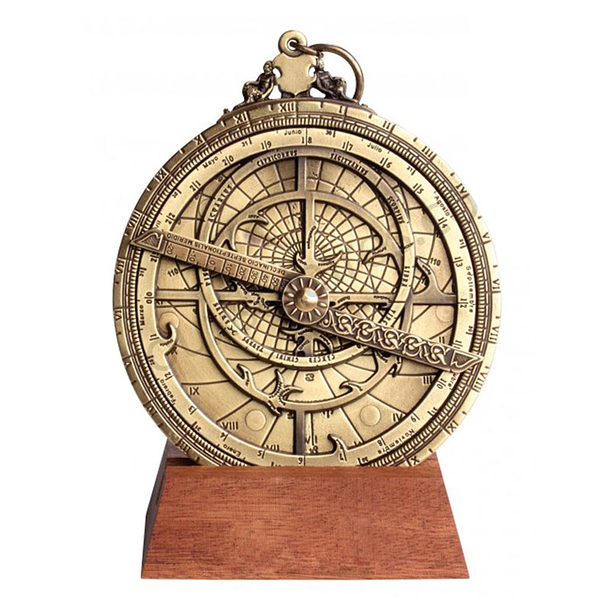
astrolabe [as-truh-leyb] ExamplesWord Origin noun
- an astronomical instrument for taking the altitude of the sun or stars and for the solution of other problems in astronomy and navigation: used by Greek astronomers from about 200 b.c. and by Arab astronomers from the Middle Ages until superseded by the sextant.
Origin of astrolabe 1325–75; Middle English, variant of astrolabie Medieval Latin astrolabium Late Greek astrolábion, Greek astrolábon (neuter of astrolábos, adj. used as noun), equivalent to ástro(n) star + lab- (variant stem of lambánein to take, seize) + -on neuter suffixRelated formsas·tro·lab·i·cal [as-truh-lab-i-kuh l, -ley-bi-] /ˌæs trəˈlæb ɪ kəl, -ˈleɪ bɪ-/, adjective Examples from the Web for astrolabe Historical Examples of astrolabe
The rest of the voyage of the Astrolabe was in well-known waters.
Celebrated Travels and Travellers
Jules Verne
There were also in this library an astrolabe, and a sphere with the signs of the Zodiac.
John Willis Clark
The Astrolabe had anchored in the same depth, and upon a similar bottom.
Celebrated Travels and Travellers
Jules Verne
Astrolabe: a machine used at sea to measure the distances of stars.
Mrs. H. R. Haweis
See Chaucer’s own treatise on The Astrolabe, which he describes.
Chaucer’s Works, Volume 5 (of 7) — Notes to the Canterbury Tales
Geoffrey Chaucer
British Dictionary definitions for astrolabe astrolabe noun
- an instrument used by early astronomers to measure the altitude of stars and planets and also as a navigational aid. It consists of a graduated circular disc with a movable sighting deviceCompare sextant
Word Origin for astrolabe C13: via Old French and Medieval Latin from Greek, from astrolabos (adj), literally: star-taking, from astron star + lambanein to take Word Origin and History for astrolabe n.
mid-14c., from Old French astrelabe, from Medieval Latin astrolabium, from Greek astrolabos (organon) “star taking (instrument),” from astron “star” (see astro-) + lambanien “to take” (see analemma).
astrolabe in Science astrolabe [ăs′trə-lāb′]
- An ancient instrument used widely in medieval times by navigators and astronomers to determine latitude, longitude, and time of day. The device employed a disk with 360 degrees marked on its circumference. Users took readings from an indicator that pivoted around the center of the suspended device like the hand of a clock. The astrolabe was replaced by the sextant in the 18th century.
 Liberal Dictionary English Dictionary
Liberal Dictionary English Dictionary